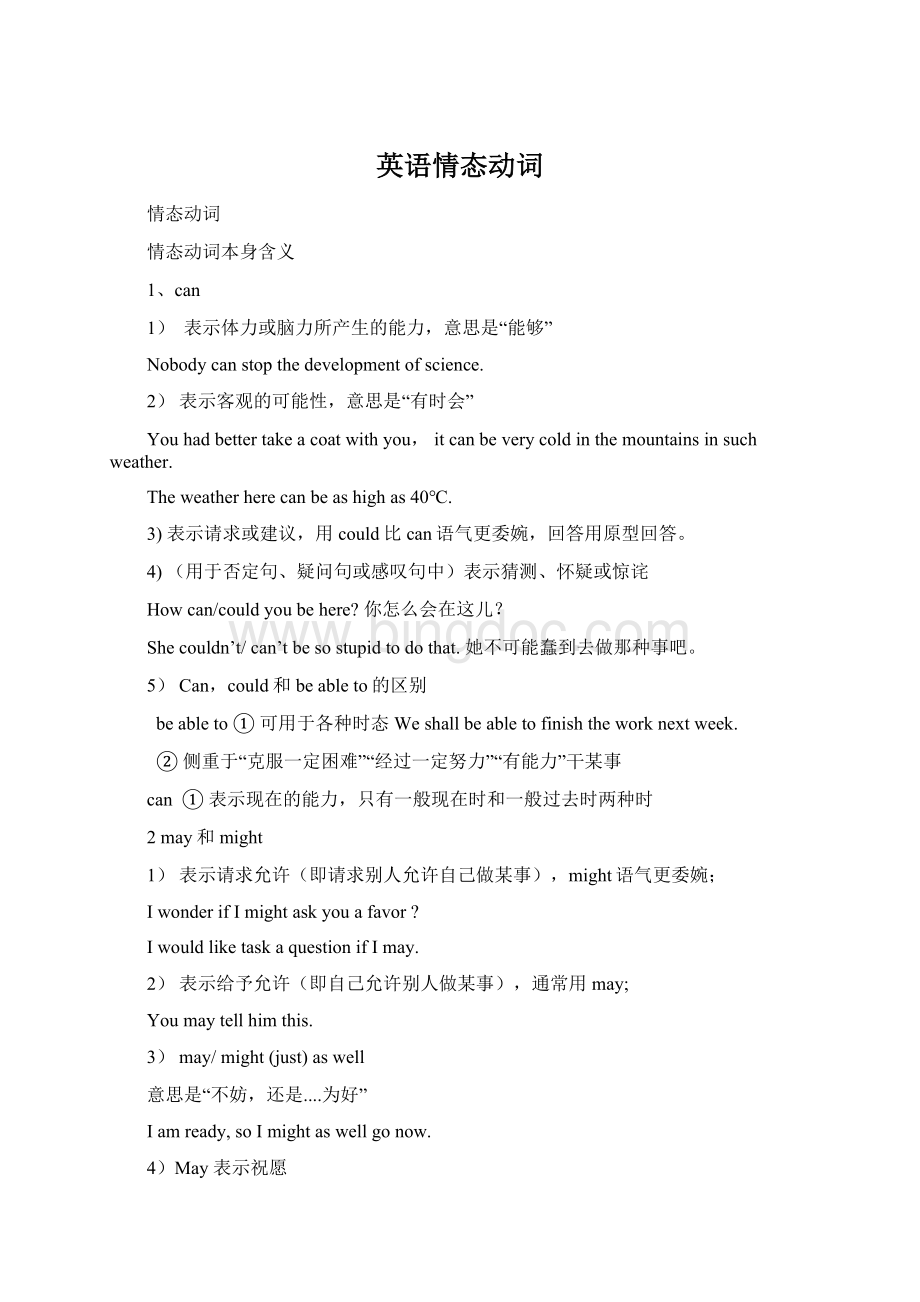英语情态动词.docx
《英语情态动词.docx》由会员分享,可在线阅读,更多相关《英语情态动词.docx(11页珍藏版)》请在冰点文库上搜索。

英语情态动词
情态动词
情态动词本身含义
1、can
1)表示体力或脑力所产生的能力,意思是“能够”
Nobodycanstopthedevelopmentofscience.
2)表示客观的可能性,意思是“有时会”
Youhadbettertakeacoatwithyou,itcanbeverycoldinthemountainsinsuchweather.
Theweatherherecanbeashighas40℃.
3)表示请求或建议,用could比can语气更委婉,回答用原型回答。
4)(用于否定句、疑问句或感叹句中)表示猜测、怀疑或惊诧
Howcan/couldyoubehere?
你怎么会在这儿?
Shecouldn’t/can’tbesostupidtodothat.她不可能蠢到去做那种事吧。
5)Can,could和beableto的区别
beableto①可用于各种时态Weshallbeabletofinishtheworknextweek.
②侧重于“克服一定困难”“经过一定努力”“有能力”干某事
can①表示现在的能力,只有一般现在时和一般过去时两种时
2may和might
1)表示请求允许(即请求别人允许自己做某事),might语气更委婉;
IwonderifImightaskyouafavor?
IwouldliketaskaquestionifImay.
2)表示给予允许(即自己允许别人做某事),通常用may;
Youmaytellhimthis.
3)may/might(just)aswell
意思是“不妨,还是....为好”
Iamready,soImightaswellgonow.
4)May表示祝愿
maysb+V/be+adjwishsb+n
Mayyoubehappy.
3must
1)表示“必须”:
可用于肯定句、否定句或疑问句,用于否定句时,mustn’t的意思是“一定不要,不能”,表示禁止。
Watermustbepureifitistobedrunk.
2)表示“偏偏”:
即某事就在某个当紧的时候发生,多指不受欢迎的事;还可指主观上的偏执,即”偏,偏要”
Thecarmustbreakdownjustwhenwewerestartingourholiday.
AfterIgaveheradvice,shemustgoanddotheopposite.
3)must和haveto的区别
①must侧重说话者的主观看法,认为有必要或有义务去做某事;haveto侧重客观需要,含有“不得不,被迫”之意。
②must只有现在时,haveto有多种时态形式
4shall,should,oughtto
(1)shall
1)shall用于疑问句,一三人称:
征求对方意见,“要不要,.....好吗?
”
ShallIgetachairforyou?
2)shall用于陈述句,二三人称:
说话者的允诺、告诫、威胁、命令、规定、必然性等:
Youshallhandinyourhomeworktomorrow.
3)shall经常用在法律、法规后,例如rules,agreement,contract,law等
Accordingtotherules,studentsinthisschoolshallwearschooluniform.
(2)Should和oughtto
1)表示义务或责任,意为“应该”
Weshould\oughttolearnfromeachother.
2)表示建议或这劝告,意为“应该”
Youshouldgiveupsmoking.
3)表示意外或惊讶,有时与why,who,how等疑问词连用,意为“竟然”
Itisstrangethatheshouldcomesolate.
4)用于征求意见:
主要用于第一人称的疑问句
ShouldIopen/oughtItoopenthewindow?
5)表示谦逊或委婉,通常与like,love,think,say,imagine等动词连用
Ishouldimaginethatitwilltakeaboutthreehours.
5will和would
1)will和would均可以表示意愿,will可以指现在的意愿,would用于指过去的意愿
Hewilldoanythingexceptcook.
HeaskedifIwouldshowhimtheway.
2)Won’t和wouldn’t均可以表示拒绝,前者用于现在将来时,后者用于过去;二者表示拒绝且主语为物时,意思通常翻译为“就是,总是”
Hesaidthathewouldn’tlendmemoney.
Thecarwouldn’tstartthismorning.
3)表示委婉语气,用于征求意见或提出请求。
Willyoupleasepassmethepaper?
4)与like,love,hate,prefer,beglad,behappy等连用,用来提出想法
Iwouldliketomakeasuggestion.
5)表示习惯或倾向,既可以指人也可以指物:
will指现在的习惯,would指过去的习惯
Hewillalwayscomplainifhegetstheopportunity.
That’sjustlikehim------hewouldlosehiskeys.
6)表示执意或坚持:
will用于现在,would用于过去
Hewillcombhishairatthetable,eventhoughheknowsidon’tlikeit.
7)Will还可以表示决心,许诺,指示,叮嘱等
Iwon’tleaveyou.Youdon’tneedtoworryaboutthis.
6need和dare
1)Need做情态动词,常用于否定句、疑问句和条件句
Youneedn’tdoitagain.
做实意动词时,+todo/tobedone/doing
2)dare:
情态动词:
敢,用于都定居、疑问句和if或whether之后,一般不用于肯定句
Dareyoutellthetruth?
实意动词时,后+todo
Doesshedaretogoalone?
情态动词表示猜测
情态动词表推测和可能性的用法
must意为“一定,一定是”只用于肯定句
现在can一般用于否定句和疑问句,can’t表示“不可能”
could+do
may一般用于肯定句和否定句,maynot意为“可能不”
might
musthavedone:
一定已经做过某事
过去can\couldhavedone:
否定句和疑问句:
可能或不可能,肯定句:
本来能做某事(而没做),
may\mighthavedone:
对过去的不肯定推测
其他注意点:
1)Can用于肯定句中表示客观的或理论上的可能性
Insuchbadweatheraccidentscanhappen.
2)Should与oughtto表示按照常理推断,不出意料的话可以得出推断,意为“应该”,“可能”,“按道理会”
Itisnearlyseveno’clock,heshouldbehereatanytime.
3)Will和would都可用于表示推测,will用于谈论现在,would用于谈论过去,也可以用来谈论现在,只是语气比较委婉,不确定。
Hewillbewaitingdownstairsnow.
Youwouldn’ttellanyone,wouldyou?
4)Oughtto/shouldhavedone:
表示过去本应该做某事而没有做
Oughtnotto/shouldnothavedone:
竟然做了某事
Ishouldhavewatchedthegame,butIwastoobusy.
5)Needn’thavedone:
不必做某事而做了
Weneedn’thavesaidsorrytohim.
6)Wouldhavedone:
过去本来会
Theywouldhavecome,butwedidn’tinvitethem.
情态动词的其他用法
1Cannot/never....too....无论怎样....都不过分
Youcan’tbetoocareful.
Youcanneverdotheworktoowell.
2canbut/canonly:
只好,至多不过
Wecanbutdoourbest.
Wecouldbutstayuntilhelpcame.
3cannothelpbutdo,cannothelp/stopdoing:
不得不,禁不住
Ican’thelpbutlaughloudly.
4may/mightaswell:
还是...的好
Itistoolate.Youmightaswellnotgo.
5must表示偏执、固执
Itcan’thelp.Hemustgowithus.没办法,他非要跟着我们
Whymustyoulistentohim?
你为什么偏要听他的?
6will表示规律性的注定会
Manwilldiewithoutwater.
情态动词+havedone
情态动词
+完成式
用法
例句
must
have
done
表示对过去已经发生的行为进行推测,意为“想必/准是/一定做了某事”。
Itmusthaverainedlastnightfortheroadwasquitemuddy.
can
have
done;
cannot
have
done
表示对过去发生的行为的怀疑和不肯定,通常用在疑问句和否定句中,意为“可能干过某事吗?
”;“不可能干过某事”。
Canhehavegonetohisaunt's?
Hecannothaveforgottenit.
could
have
done
“已经……”之意,此外,还可以表示过去没有实现的可能性,意为“本来可以……”。
IsawMr.Wangjustnow.Hecouldn'thavegonetoBeijing.
may/
might
have
done
表示对过去已发生行为的推测,意为“也许/或许已经(没有)……”。
一般只用于肯定句或否定句中(在否定句中表示“可能不”),不用于疑问句。
用might则表示语气更加不肯定。
It'stoolate.Ithinkhemayhavegonetobed.Hemaynothavefinishedthework.Shemighthavecaughtacold.
might
have
done
表示“本来可能……”,但实际上没有发生的事。
另外,还可以表示“本来应该或可以做某事”之意,含有轻微的责备语气。
Youshouldnothaveswuminthatsea.Youmighthavebeeneatenbyfish.
Youmighthavegivenhimmorehelp,thoughyouwerebusy.
should
/ought
tohave
done
用于肯定句时,表示本该做某事,而实际上未做,意为“本应该”;用于否定句时,则表示不该做的事反而做了,意为“本不应该”。
Youshouldhavecometothemeetingearlier.Yououghttohavedonethisexercisemorecarefully.
Youshouldn'thavetoldherthetruth.
Heoughtnottohavetreatedhisparentslikethat.
needn't
have
done
表示做了本来不必去做的事,意为“本没必要做某事”;而didn'tneedtodo则表示过去没必要做而实际上也没有做某事。
Youneedn'thavetakenataxihere,foritwasveryneartomyhouse.Ididn'tneedtocleanthewindows.Mybrotherdidit.
had
better
have
done
用于事后的建议,含轻微责备的口吻,意为“当时最好做了某事”,其否定式hadbetternothavedone表达相反的含义。
Youhadbetterhavestartedearlier.
Youhadbetternothavescoldedher.
would
rather
have
done
表示“宁愿做过某事”,其否定式wouldrathernothavedone表达相反的含义,两者都表示“后悔”之意。
Iwouldratherhavetakenhisadvice.
Iraisedobjectionsatthemeeting,butnowIwouldrathernothavedonethat.
would
like/
loveto
have
done
表示过去愿意做某事,但未做成,意为“愿意做过某事”。
IwouldlovetohavegonetothepartylastnightbutIhadtoworkextrahourstofinishareport.
例题精讲
【2014】
1.(2014大纲全国卷,30,1分)Althoughyou______findbargainsinLondon,it’snotgenerallyacheapplacetoshop.
A.should B.need C.must D.can
2.(2014重庆,3,1分)I’veorderedsomepizza,sowe______worryaboutcookingwhenwegethometired.
A.can’t B.darenot C.needn’t D.maynot
3.(2014四川,6)Istillremembermyhappychildhoodwhenmymother______takemetoDisneylandatweekends.
A.might B.must C.would D.should
4.(2014江西,30,1分)Lifeisunpredictable;eventhepoorest______becometherichest.
A.shall B.must C.need D.might
5.(2014湖南,25,1分)—I’vepreparedallkindsoffoodforthepicnic.
—Doyoumeanwe______bringanythingwithus?
A.can’t B.mustn’t C.shan’t D.needn’t
6.(2014陕西,25,1分)Mybook,TheHouseofHades,ismissing.Who______havetakenit?
A.need B.must C.should D.could
7.(2014江苏,31,1分)Itwassadtomethatthey,sopoorthemselves,______bringmefood.
A.might B.would C.should D.could
8.(2014北京,27)______Ihaveawordwithyou?
Itwon’ttakelong.
A.Can B.Must C.Shall D.Should
[答案]1.D[答案]2.C[答案]3.C[答案]4.D
[答案]5.D[答案]6.D[答案]7.C[答案]8.A
巩固加强
1.(2013大纲,26,1分)Sincenobodygavehimanyhelp,he havedonetheresearchonhisown.
A.can B.must C.would D.need
2.(2013重庆,26,1分)—WhatareyoudoingthisSaturday?
—I’mnotsure,butI gototheRollingStonesconcert.
A.must B.would C.should D.might
3.(2013四川,5,1分)—Whyareyoureyessored?
You havesleptwelllastnight.
—Yeah,Istayeduplatewritingareport.
A.can’t B.mustn’t C.needn’t D.won’t
4.(2013江西,29,1分)WhenIwasachild,I watchTVwheneverIwantedto.
A.should B.could C.must D.need
5.(2013湖南,32,1分)He sleep,althoughhetriedto,whenhegotonsuchahuntforanideauntilhehadcaughtit.
A.wouldn’t B.shouldn’t C.couldn’t D.mustn’t
6.(2013陕西,21,1分)Thechildren lostinthewoods;otherwise,theywouldhavebeenatthelakesidecampasscheduled.
A.musthavegot B.mustget C.shouldhavegot D.shouldget
7.(2013陕西,12,1分)Mymomsuggeststhatwe eatoutforachangethisweekend.
A.should B.might C.could D.would
8.(2013安徽,34,1分)It bethevocabularythatcausedyoutheproblemintheexercisebecauseyouknowalotofwords.
A.may B.couldn’t C.should D.needn’t
9.(2013天津,9,1分)Noone bemoregenerous;hehasaheartofgold.
A.could B.must C.dare D.need
10.(2013北京,35,1分)—Youneedn’ttakeanumbrella.Itisn’tgoingtorain.
—Well,Idon’tknow.It do.
A.might B.need C.would D.should
11.(2013课标II,6,1分)Sincenobodygavehimanyhelp,he havedonetheresearchonhisown.
A.can B.must C.would D.need
12.(2013课标I,29,1分)Thedoor open,nomatterhowhardshepushed.
A.shouldn’t B.couldn’t C.wouldn’t D.mightn’t
[答案]1.B[答案]2.D[答案]3.A[答案]4.B[答案]5.C[答案]6.A
[答案]7.A[答案]8.B[答案]9.A[答案]10.A[答案]11.B[答案]12.C
课后作业
【2012年】
1.(2012课标·全国Ⅰ,30)I_____useaclocktowakemeupbecauseatsixo’clockeachmorningthetraincomesbymyhouse.
A.couldn’t B.mustn’t C.shouldn’t D.needn’t
2.(2012全国Ⅱ,17)I’mgoingtoEuropeonvacationtogetherwithJohnifI_____findthemoney.
A.can B.might C.would D.need
3.(2012天津,8)It’squitewarmhere;we____turntheheatingonyet.
A.couldn’t B.mustn’t C.needn’t D.wouldn’t
4.(2012江西,22)We____haveboughtsom